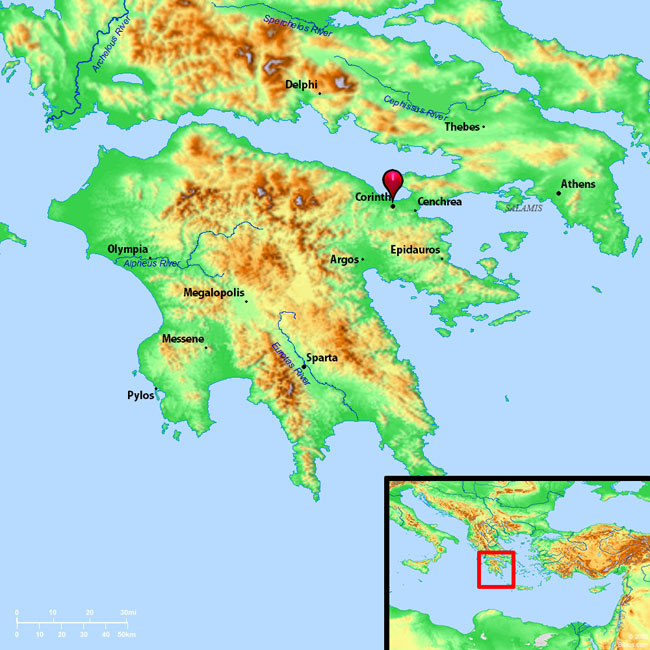



1Cor 1:7-8,15, 2:1-2; Ecc 8:15; Luk 9:23-26; 1Cor 1:22-31; Phi 2:1-11
ROMANS-121-100721 - length: 59:01 - taught on Jul, 21 2010
Class Outline:
Pastor-Teacher
John Farley
Wednesday,
July 21, 2010
The first letter of Paul to the Corinthians can be seen as an appeal to unity in the face of some shocking examples of disunity.
The Doctrine of Spiritual Gifts
Point 1: Setting the scene for Paul’s teaching on the Spiritual Gifts.
The most extensive treatment of the subject of spiritual gifts is found in Paul’s first letter to the Corinthians, chapters 12 through 14.
1. Paul had received an oral report from a woman by the name of Chloe with some alarming information, 1CO 1:11; 5:1.
This problem was festering in the church of Corinth, and Paul addressed the problem head on with his teaching on the spiritual gifts.
This problem was disunity.
This will help you be honest with yourself about the problems you have and the problems the rest of us have and realize that without the grace of God we’re nothing.
Grace is free, limitless, unmerited blessing to helpless, undeserving sinners from the loving God who is completely satisfied by the Person and Work of the Lord Jesus Christ.
Grace means that man has received from God that which he cannot earn or deserve.
Grace means that God has done the work, and God receives the credit, the glory.
Man receives the free benefits of God’s work.
God the Father has already blessed us with everything we will ever need for time and eternity.
One of those blessings is our subject of the spiritual gifts.
God does all the work, we benefit...
now believe that, and rest.
The word of God is a mirror, and, as we examine the ugly reality of the sin nature rearing its ugly head in Corinth, we will be looking at ourselves in our “flesh”.
Unless we understand that there is a solution to the problem, who the heck wants to just keep staring at the problem?
GAL 5:16
But I say, walk by the Spirit, and you will not carry out the desire of the flesh.
Or in a single word ....grace.
God is at work in you!
As he looks at the present condition in Corinth, he keeps pointing back to the past, to Christ on the cross, and then forward to the future, to the Rapture and the eternal state.
Two of the best weapons in the arsenal of the Holy Spirit to oppose our flesh are the Cross and the Rapture.
The Cross humbles us, and the Rapture gets our priorities straight.
Paul wrote 1 Corinthians sometime in AD 53 or 54 when he was in Ephesus.
Most of 1 Corinthians is the apostle Paul correcting the church about different problems they are having.
What happened in Corinth stayed in Corinth.
Corinth was probably the largest city in Greece at the time Paul wrote his letter. It had a population of over half a million people.

Corinth was on an isthmus, and was called “the master of two harbors”.
Corinth was on an isthmus, and was called “the master of two harbors”.
There were always lots of sailors, merchants, traders and so forth.
Corinth was at a natural crossroads for both land and sea travel.
Given their complete lack of understanding of the cross, it is ironic that their wealth came from being at the heart of a geographic cross.
It was famous as a sports town, and a trading center.
Religion in the ancient world also had its own peculiarities.
There was a strong connection between, eating, drinking, worship, and sex.
In the classical Greek period, 400 -500 years before Paul, Corinth was the center of the cult of Aphrodite, the Greek name for Venus, the goddess of erotic love.
The Greek term korinthiazomai (to behave like a Corinthian, literally) meant to practice fornication.
Corinth had a well-deserved reputation for immorality.
In 146 BC, Rome destroyed the city, killing the men and selling the women and children into slavery.
In 44 BC, Julius Caesar decides to establish a Roman colony on the site.
The Romans founded a lot of colonies. They saw it as a way to stop overcrowding in Rome and at the same time spread Roman civilization across the known world.
The Romans took their poor, former slaves, and their military veterans and “encouraged” them to resettle in colonial cities like Corinth.
All these Romans immigrated to Corinth, and you end up with a city that has a Roman identity.
One ancient writer referred to the early Corinthian settlers as “those often sold, unstable or disreputable slaves.”
America is the land peopled largely by the descendants of the discarded, the poor, and the slaves. Many of us “came from nothing” as well.
When you “come from nothing”, very often there is this drive inside to prove yourself, and then afterwards to show the world that you have made it.
Because it is humiliating to be poor.
It is no fun to be a prisoner.
It’s shameful to be a slave.
He took the form of a slave.
He became the prisoner of the Romans, and died the shameful death of the cross.
He became poor so that you might by His poverty become rich.
And now, since He is your Lord, He invites you to follow Him,
MAT 4:19; MAT 8:22; MAT 16:24; MAT 19:21; LUK 9:23; JOH 12:26; Phil 2:1-8.